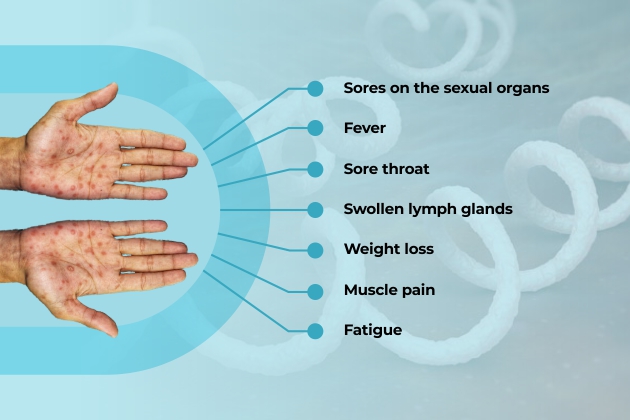

Stages of Syphilis Infection
Stating that, the causes for syphillis is sexually transmitting bacterial infection and is highly prevalent today. Most often the initial infection of syphilis often goes unnoticed. Depending upon the stages of infection, a person can exhibit multiple symptoms.
The primary stage of infection
Characteristic of this stage is either single and/or multiple painless, round-shape sores, often known as a chancre. These sores may last for almost six to eight weeks with and/or without treatment. Administration of timely treatment advisable at this stage to limit its progression to the secondary infection that is often more dangerous.
The secondary stage of infection
Apart from the presence of typical rash at more than one part of the body, this stage is often characterized by multiple other symptoms like
- Sores on the sexual organs
- Fever
- Sore throat
- Swollen lymph glands
- Weight loss
- Muscle pain
- Fatigue
If untreated at this stage, the infection can advance to the tertiary phase of infection
The tertiary stage of infection
This is the most advanced stage of infection. Generally, 30-40% of the people not getting treatment at right time can develop the same. People with this stage of infection suffer from dementia, mental fog, severe headache, cardiovascular issues, and paralysis.
Causes And Risk Factors of Syphilis
As already explained, syphilis causing bacteria enters the body through direct contact with an infected person. It is important to note that the infection does not spread after using cloths, napkins, and other items of an infected person. On a general note, an individual who is involved in sexual intercourse with an infected person without using protection is at a higher risk of infection. Especially, women with advanced stage of infection can have a direct impact on their pregnancies as well as newborn babies and hence, are at increased risk.
Diagnosis and Prognosis
The infection with syphilis often goes latent for years and can turn out fatal at times. Thus, it is advised that people with active sexual life and who do not use any prescribed protection during intercourse should opt for a VDRL test to confirm infection.
Early as well as secondary syphilis is easily curable with timely administration of antibiotics; preventing it from damaging other organs. However, the damage associated with organs in the tertiary phase of infection is often irreversible.








